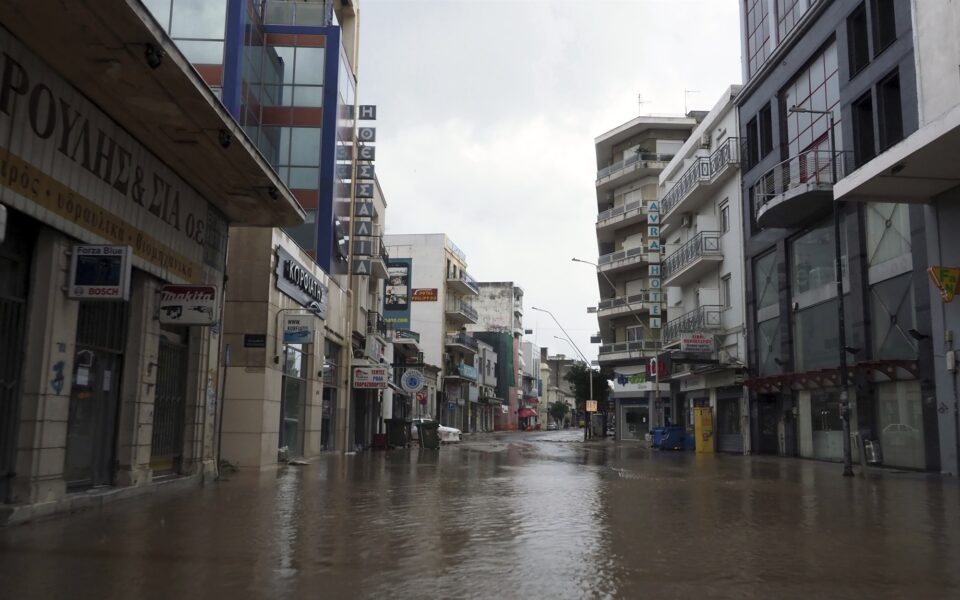Water covers a main street after the rainstorm in Volos, central Greece, Wednesday. ‘In the case of Volos and Thessaly in general, mayors, governors, ministers and generals acted individually without coordination,’ this author notes. [AP]
My family moved to the city of Volos in 1965 and, with a few breaks in between, most of them live there to this day. Volos is my hometown in Greece. Seeing the scenes of the flood breaks my heart; the areas that reporters talk about, and the pictures I see, are part of my life. I grew up in Nea Ionia, I had friends in Palia; seeing those areas under water is tough.
My mother and sister are, as I am writing this, trapped in their apartment without power or water for three days now; only other immigrants can understand my frustration and anguish being so far away and helpless to assist my loved ones.
I read and hear so many points of view that frankly I am tired of them. Pro-government sources claim that this was a natural disaster which none could have foreseen or managed (true). Anti-government sources claim that the extent of the disaster notwithstanding, the government bears great responsibility for many failures (also true). Others point to the fact that this is a diachronic problem; governments of New Democracy, PASOK and SYRIZA have failed to take measures needed (anti-flood projects etc) or allowed subpar work on critical infrastructure (true again).
I believe we just witnessed once more the absence and ineffectiveness of the Greek state. Let’s accept that the recent floods were unpredictable, unavoidable, and unprecedented. Let’s accept that this government, like the previous ones, has no responsibility for faulty bridges, badly constructed roads etc. The question that remains then is this: Where was the plan to evacuate people from a disaster area and/or deliver food, water etc to those in need?
This is not a political or ideological issue; it has nothing to do with political parties and elections. Greece is a modern, prosperous European country. A member of the European Union and NATO; one assumes that for decades now, let’s say for the sake of this column since 1980, Greece has had a well-thought-out plan of how to deal in the case of a city becoming a disaster zone due to fire, flood, other natural disasters, civil unrest or even an attack from a foreign enemy. A plan which would take into account the country’s capabilities, civil and military, which could be used for mass evacuations or support of a dislocated civilian population.
At this point there is one question that they need to answer: Is Greece a modern European country or is it a failed state?
Such a plan would certainly be reviewed and revised every few years to account for changes; a plan that would be ready to put into practice regardless of the political party in power. Such a plan would have in place a state apparatus to coordinate emergency responses and while the head of such an organization could be a political appointee, the personnel would be non-party civil servants trained and dedicated to the task.
It is clear today that the above-described scenario is a work of fiction. In the case of Volos and Thessaly in general, mayors, governors, ministers and generals acted individually without coordination. The mayor announces he has water to distribute but only in four or five places (for a city of 140,000 people); the governor (or someone else, is not clear) says more water is on the way but when and where no one knows. The general is put in charge, but we find out there is not enough equipment to evacuate people (bulldozers moving people is not a sign of preparedness). And the ministers (I use the plural because, in typical Greek fashion, there are overlapping jurisdictions) wait for the prime minister to come on site to do what? Drive a bulldozer? Order people to do the job they should be doing anyway? Produce plans and equipment out of thin air?
During the last elections Prime Minister Kyriakos Mitsotakis told the Greek people that Greece was doing well and under his leadership the country will move forward. I believe he meant what he said, but it is time he, his government, and the rest of the Greek political parties face reality. At this point there is one question that they need to answer: Is Greece a modern European country or is it a failed state?
John Mazis is professor of history at Hamline University in Saint Paul, Minnesota.


